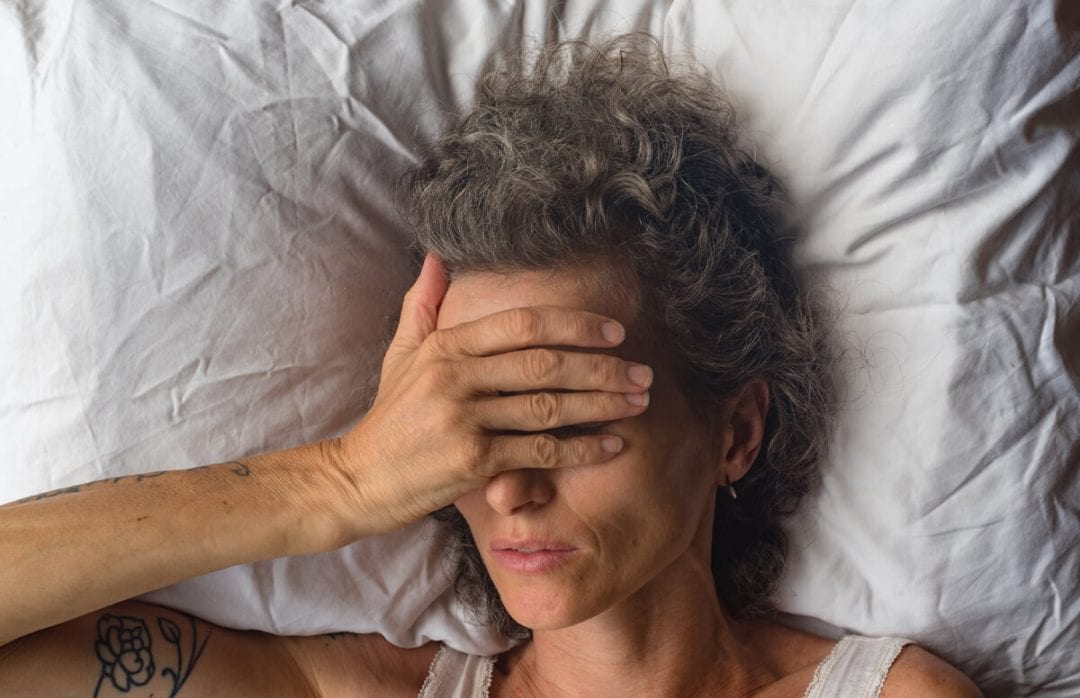Women enter menopause at an average age of 51, but it can happen earlier or later than that. And when it does, a woman’s life is filled with intense change. “During this time there are hormonal, physical and psychological changes happening that are completely disruptive to your life that often need swift medical intervention,” observes Dr. Sherry Ross, OB/GYN and author of She-ology: The Definitive Guide to Women’s Intimate Health. Period.
One complaint with far-reaching effects: sleep loss. Menopause can cause a myriad of sleep difficulties, which can in turn lead to other health issues down the line. Luckily, there are a few solutions that can help.
How Menopause Affects Sleep
Melatonin supply decreases with age, so falling asleep becomes more difficult for many people. For women, the struggle for sleep is amplified when they reach menopause, which has been directly linked to sleep disturbances.
In fact, the National Sleep Foundation reports that up to 61 percent of post-menopausal women struggle with sleep.
“Up to 85 percent of [menopausal] women experience hot flashes occurring in the middle of the night, causing insomnia. Hot flashes can last three to six minutes, making it difficult to go back to sleep [and] affecting the overall quality of sleep,” says Ross.
Why Sleep Matters
Losing sleep can have a host of short- and long-term consequences that can seriously affect quality of life. People who are sleep deprived may have less ability to focus, impaired memory (memories are consolidated during deep sleep) and coordination problems. Chronic sleep loss is also associated with heart disease, diabetes, obesity and even early death.
The intermittent sleep loss caused by hot flashes is especially concerning from a cognitive perspective. Fragmented or frequently interrupted sleep has been associated with Alzheimer’s disease and cognitive decline in older adults.
5 Solutions for Menopausal Sleep Loss
While the health issues that may accompany sleep loss are serious, there are some solutions that can help improve both quality and quantity of sleep during menopause:
1. Develop healthy sleep habits.
“Establishing good sleep hygiene is first-line treatment for any sleep disturbance,” says Laurie Jeffers, a nurse practitioner and clinical assistant professor at NYU Rory Meyers College of Nursing. She warns against using sleeping pills or benzodiazepines (such as Valium and Xanax) as long-term solutions, since they can have adverse side effects like dependence and withdrawal.
It’s a good idea to establish a consistent bedtime routine, go to sleep on a predictable schedule, avoid spicy meals and caffeine before bed and put away your electronic devices to help you get better sleep.
2. Consider hormone replacement therapy (HRT).
Jeffers says that while HRT is not currently approved for treatment of insomnia, it will decrease hot flashes and therefore might improve sleep. HRT has been controversial; read this Next Avenue article for more details.
3. Consider alternative therapies.
Alternative medicine may be helpful for symptoms causing sleep loss. “Recent studies have also shown efficacy for yoga and acupuncture,” notes Jeffers. Ross agrees and adds that if the hot flashes are mild, trying black cohosh or passion flower extract may help. (Tell your doctor about any herbal remedies or supplements you decide to take.)
4. Address psychological or emotional issues that arise.
Ross notes that anxiety, depression and other mood disorders that can accompany menopause may also be responsible for some women’s sleep problems. She suggests that in addition to hormone replacement therapy, antidepressants and other mood-stabilizing medications may effectively treat symptoms like depression and anxiety — and help restore sleep.
5. Consider lifestyle modifications.
Certain lifestyle changes can have a positive impact on most health issues, and menopause sleep issues are no exception. Ross suggests “exercising regularly, eating a diet focused on fresh fruits, vegetables, whole grains and fish [and] limiting alcohol intake and red meat, similar to the Mediterranean diet.”
Consult Your Doctor
Any women suffering from chronic sleep issues that remain untreated should seek the help of a professional.
“Women who suffer from poor sleep at midlife should be evaluated for chronic illness,” says Jeffers. One serious disorder is sleep apnea, marked by snoring, interrupted breathing and daytime sleepiness.
Ross and Jeffers suggest seeing your primary care physician to discuss bothersome symptoms and possibly pursue further testing. Menopause — and the potential sleep issues that come with it — should not stop you from enjoying your life.
Hilary Thompson is a Salt Lake City freelance journalist and mother of two who loves to write about everything from older adult health to parenting to sleep disorders.
Next Avenue Editors Also Recommend:
-
Remedies for Painful Sex After Menopause
-
Ways to Manage Menopause With Diabetes
-
Why Can’t I Sleep? 8 Top Reasons for Insomnia
Next Avenue is bringing you stories that are not only motivating and inspiring but are also changing lives. We know that because we hear it from our readers every single day. One reader says,
“Every time I read a post, I feel like I’m able to take a single, clear lesson away from it, which is why I think it’s so great.”
Your generous donation will help us continue to bring you the information you care about. What story will you help make possible?
Sponsored Links
This content was originally published here.







